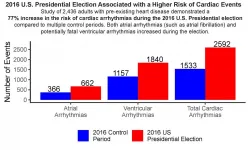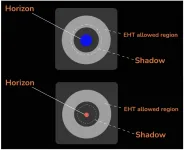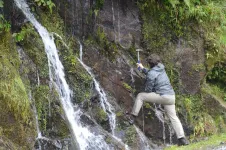(Press-News.org) Young children who practice visual working memory and reasoning tasks improve their math skills more than children who focus on spatial rotation exercises, according to a large study by researchers at Karolinska Institutet in Sweden. The findings support the notion that training spatial cognition can enhance academic performance and that when it comes to math, the type of training matters. The study is published in the journal Nature Human Behaviour.
"In this large, randomized study we found that when it comes to enhancing mathematical learning in young children, the type of cognitive training performed plays a significant role," says corresponding author Torkel Klingberg, professor in the Department of Neuroscience, Karolinska Institutet. "It is an important finding because it provides strong evidence that cognitive training transfers to an ability that is different from the one you practiced."
Numerous studies have linked spatial ability--that is the capacity to understand and remember dimensional relations among objects--to performance in science, technology, engineering and mathematics. As a result, some employers in these fields use spatial ability tests to vet candidates during the hiring process. This has also fueled an interest in spatial cognition training, which focuses on improving one's ability to memorize and manipulate various shapes and objects and spot patterns in recurring sequences. Some schools today include spatial exercises as part of their tutoring.
However, previous studies assessing the effect of spatial training on academic performance have had mixed results, with some showing significant improvement and others no effect at all. Thus, there is a need for large, randomized studies to determine if and to what extent spatial cognition training actually improves performance.
In this study, more than 17,000 Swedish schoolchildren between the ages of six and eight completed cognitive training via an app for either 20 or 33 minutes per day over the course of seven weeks. In the first week, the children were given identical exercises, after which they were randomly split into one of five training plans. In all groups, children spent about half of their time on mathematical number line tasks. The remaining time was randomly allotted to different proportions of cognitive training in the form of rotation tasks (2D mental rotation and tangram puzzle), visual working memory tasks or non-verbal reasoning tasks (see examples below for details). The children's math performance was tested in the first, fifth and seventh week.
The researchers found that all groups improved on mathematical performance, but that reasoning training had the largest positive impact followed by working memory tasks. Both reasoning and memory training significantly outperformed rotation training when it came to mathematical improvement. They also observed that the benefits of cognitive training could differ threefold between individuals. That could explain differences in results from some previous studies seeing as individual characteristics of study participants tend to impact the results.
The researchers note there were some limitations to the study, including the lack of a passive control group that would allow for an estimation of the absolute effect size. Also, this study did not include a group of students who received math training only.
"While it is likely that for any given test, training on that particular skill is the most time-effective way to improve test results, our study offers a proof of principle that spatial cognitive training transfers to academic abilities," Torkel Klingberg says. "Given the wide range of areas associated with spatial cognition, it is possible that training transfers to multiple areas and we believe this should be included in any calculation by teachers and policymakers of how time-efficient spatial training is relative to training for a particular test."
The researchers have received funding by the Swedish Research Council. Torkel Klingberg holds an unpaid position as chief scientific officer for Cognition Matters, the non-profit foundation that owns the cognition training app Vektor that was used in this study.
Examples of training tasks in the study
In a number line task, a person is asked to identify the right position of a number on a line bound by a start and an end point. Difficulty is typically moderated by removing spatial cues, for example ticks on the number line, and progress to include mathematical problems such as addition, subtraction and division.
In a visual working memory task, a person is asked to recollect visual objects. In this study, the children reproduced a sequence of dots on a grid by touching the screen. Difficulty was increased by adding more items.
In a non-verbal reasoning task, a person is asked to complete sequences of spatial patterns. In this study, the children were asked to choose the correct image to fill a blank space based on previous sequences. Difficulty was increased by adding new dimensions such as colors, shapes and dots.
In a rotation task, a person is asked to figure out what an object would look like if rotated. In this study, the children were asked to rotate a 2D object to fit various angles. Difficulty was moderated by increasing the angle of the rotation or the complexity of the object being rotated.
INFORMATION:
Publication: "Training spatial cognition enhances mathematical learning in a randomized study of 17,000 children," Nicholas Judd, Torkel Klingberg, Nature Human Behaviour, online May 20, 2021, doi: 10.1038/s41562-021-01118-4
A particular type of dendritic cell is responsible for the tissue damage that occurs in non-alcoholic steatohepatits (NASH) in mice and humans. The dendritic cells cause aggressive, proinflammatory behavior in T cells, as now discovered by researchers from the German Cancer Research Center (DKFZ) in collaboration with colleagues from Israeli research institutes. Blocking these dendritic cells alleviates symptoms in mice. This type of approach might also prevent the development of serious liver damage in NASH patients.
Obesity is extremely widespread in the Western world, and 90 percent of those affected show signs of fatty degeneration of the liver. If they maintain an unhealthy lifestyle ...
Solar geoengineering -- putting aerosols into the atmosphere to reflect sunlight and reduce global warming -- is not a fix-all for climate change but it could be one of several tools to manage climate risks. A growing body of research has explored the ability of solar geoengineering to reduce physical climate changes. But much less is known about how solar geoengineering could affect the ecosystem and, particularly, agriculture.
Now, research from the Harvard John A. Paulson School of Engineering and Applied Sciences (SEAS) finds that solar geoengineering may be surprisingly effective in alleviating some of the worst impacts of ...
CHAPEL HILL, NC - American politics can be stressful and confrontational, which can lead to anger. The combination of intense stress and negative emotions can trigger potentially fatal cardiovascular events in people who are susceptible to these health issues. But the direct link between a stressful political election and an increase in cardiac events hadn't been established, until now. A new study in the Journal of the American Heart Association is the first to show that exposure to a stressful political election is strongly associated with an increase in potentially life-threatening cardiac events.
"This retrospective ...
A team led by a social work researcher at The University of Toledo has published the first empirical evidence that emotional support animals can provide quantifiable benefits to individuals with serious mental illness who are experiencing depression, anxiety and loneliness.
The research brings credence to the many anecdotal reports of emotional support animals having positive impacts on chronic mental health issues.
"This is the first peer-reviewed, published scientific evidence that emotional support animals may benefit people's mental health," said Dr. Janet Hoy-Gerlach, a professor of social work and the lead investigator on the project. "My hope is that our pilot study catalyzes additional research in this area with more rigorous ...
FRANKFURT. As first pointed out by the German astronomer Karl Schwarzschild, black holes bend space-time to an extreme degree due to their extraordinary concentration of mass, and heat up the matter in their vicinity so that it begins to glow. New Zealand physicist Roy Kerr showed rotation can change the black hole's size and the geometry of its surroundings. The "edge" of a black hole is known as the event horizon, the boundary around the concentration of mass beyond which light and matter cannot escape and which makes the black hole "black". Black holes, theory predicts, can be described by a handful ...
When scientists hunt for life, they often look for biosignatures, chemicals or phenomena that indicate the existence of present or past life. Yet it isn't necessarily the case that the signs of life on Earth are signs of life in other planetary environments. How do we find life in systems that do not resemble ours?
In groundbreaking new work, a team* led by Santa Fe Institute Professor Chris Kempes has developed a new ecological biosignature that could help scientists detect life in vastly different environments. Their work appears as part of a special issue of theBulletin ...
The chemical bisphenol F (found in plastics) can induce changes in a gene that is vital for neurological development. This discovery was made by researchers at the universities of Uppsala and Karlstad, Sweden. The mechanism could explain why exposure to this chemical during the fetal stage may be connected with a lower IQ at seven years of age - an association previously seen by the same research group. The study is published in the scientific journal Environment International.
"We've previously shown that bisphenol F (BPF for short) may be connected with children's cognitive development. However, with this study, we can now begin to understand which biological mechanisms may explain such a link, which is unique for an epidemiological study." ...
A new study provides public health planning authorities with a method of calculating the number of COVID-19 isolation beds they would need for people experiencing homelessness based on level of infection in the city. The research holds promise for controlling spread of the virus - or future infectious diseases - in a population that is highly vulnerable and less likely than many others to access health care services.
The report, developed to support public health decision-making in Austin, Texas, was recently published by PLOS ONE. The paper's first author is an undergraduate student at The University of Texas at Austin, Tanvi Ingle, who harnessed ...
In April 2017, a landslide in Mocoa, Colombia, ripped through a local town, killing more than 300 people. Nicolás Pérez-Consuegra grew up about 570 miles north in Santander, Colombia, and was shocked as he watched the devastation on television. At that time, he was an undergraduate intern at the Smithsonian Tropical Research Institute in Panama. As a budding geologist raised hiking the tropical mountains of Colombia, he wondered, what causes greater erosion in some areas of the mountains than in others? And, is it tectonic forces - where Earth's tectonic plates slide against one another leading to the formation of steep mountains - or high precipitation rates, that play a more important role in causing erosion within that region?
To answer those questions would require a geological ...
Scientists have discovered that the way in which neurons are connected within regions of the brain, can be a better indicator of disease progression and treatment outcomes for people with brain disorders such as epilepsy.
Many brain diseases lead to cell death and the removal of connections within the brain. In a new study, published in Human Brain Mapping, a group of scientists, led by Dr Marcus Kaiser from the School of Medicine at the University of Nottingham, looked at epilepsy patients undergoing surgery.
They found that changes in the local network within brain regions can be a better predictor ...





